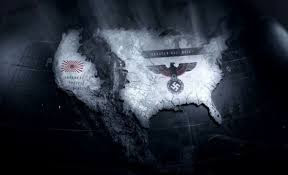Amazon released a couple of episodes of The Man in the High Castle some time back, but the full series came out at the end of last week. It’s set in a parallel present (well, parallel past now, since the book appeared in 1962). World War 2 was won by Germany and Japan. What had been the United States is now split into a huge zone covering the middle and eastern states, under the dominion of the Greater Nazi Reich, a smaller coastal area in the west administered by imperial Japan, and between them a neutral zone based around the Rocky Mountains.
 |
| An alternative reality for the United States |
It’s still gripping, though, and Juliana’s character is complex and believable.
Meanwhile, the BBC has released the latest season of The Bridge, the Swedish-Danish police series centred around the character of Saga Norén, socially awkward to the point of autism, but a thorough and gifted detective with the Swedish police in Malmo. We were a little concerned about how the story would keep going having lost Saga’s opposite number from Copenhagen, Martin Rohde, denounced by her at the end of season 2 and now in gaol. But the series keeps going just fine, with the same bewildering cast of characters, the same highly-stylised and vicious killings, and Saga driving same Porsche with its weird shade of green.
 |
| Saga Norén and her weird-coloured Porsche 911 |
The other series has just been released on Netflix. Even the Guardian talked about Jessica Jones as unusual for being yet another Marvel comics spinoff, but unusually with a strong female lead. The eponymous protagonist is played by Krysten Ritter, and she has real complexity. Still shaken by PTSD, she seeks solace in two activities which don’t play much of a role in most comics: heavy drinking and (occasionally) casual sex. She’s a compelling character, but not necessarily a nice one.
 |
| Jessica Jones: always interesting, not always nice |
I didn’t expect ever to feel anything more than slightly supercilious amusement at a comic-strip spinoff, but this one’s a cut or two above that. I’m looking forward to the next episode.
PS In a piece about strong female characters on TV, you might feel I ought to have said something about Nicola Walker. I haven’t forgotten her. Watch this space.
No comments:
Post a Comment